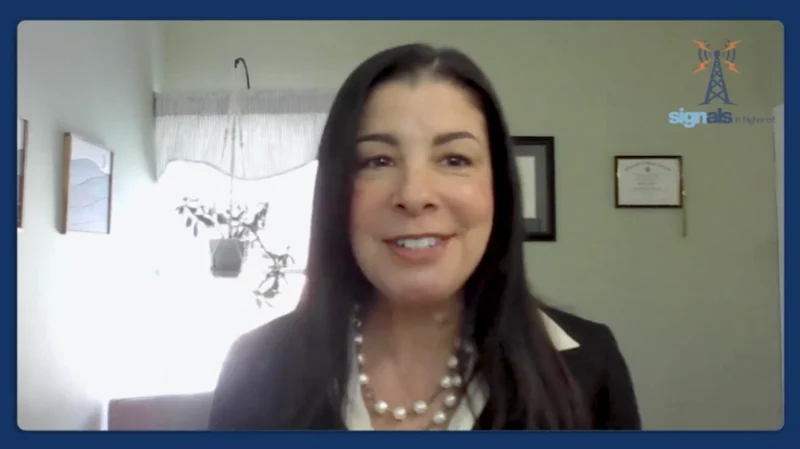Why ‘Failure’ Shouldn’t Be a Dirty Word in Education
If you talk to anyone who has been successful at reaching their goals, they’ll tell you that they had to allow fear of failure to take a passenger seat on the way there. They’ll tell you that they embraced the possibility of failure, and that, if failure was at the end of their current path, they had no problem jumping onto a new path until they reached success. Failure is an opportunity to take what you’ve learned and make a different choice the next time around. It’s not the end of the road if you fail—it’s the beginning of a climb to reach success.
Students can learn this mindset early, and edtech tools can help them get there. Students shouldn’t be solely aiming to get the correct answer. They should be seeking understanding and mastery while learning along the way. Getting to the “why” is as important as getting to the right answer. This comes with patience, persistence, and an accepting attitude toward struggle. Developing this way of thinking will positively impact all areas of a person’s life, and especially on their academic journey. Here’s how educators can help students develop those skills.
Turning Failure into Opportunity
Every time you fail, you learn to grow and persevere. Every time a student fails, they have the opportunity to learn something. That willingness to stay curious and engaged will help students build a growth mindset. Eventually, no matter what you encounter, you’ll have the confidence to plow through, creating your own pathway. This is something students can take far beyond school. Whatever profession they choose, a more positive mindset toward failure will help with whatever goals they set or obstacles they encounter in their lives.
A student can start by changing their perspective on failure. Some students—especially those who put a lot of pressure on themselves to excel—have a fear of failure that makes them feel that if they don’t learn a fact or skill the first time, then they have failed and have to start over.
Educators and the products they use can encourage students to see failure to reach a goal the first time as a stepping stone to success. This way, students understand that learning is a process: they struggle, but they don’t get frustrated and stop just because they don’t fully grasp something. They overcome roadblocks, which makes success all the more satisfying. And then the process starts again.
To help students embrace this process, appropriate rewards along the way can help reinforce the concept. “Effort” isn’t just doing the same thing over and over again. It’s experimenting with different strategies, even if the outcome isn’t correct. Any sliver of understanding students gain from the work they are doing is a step toward growth, and educators should offer positive motivation for each step.
Promoting a Growth Mindset
Educators can help students understand that it’s okay to fail by fostering a growth mindset in their classrooms. Many students enter school with a fixed mindset: the idea that their intelligence is fixed at some finite level. An important aspect of developing a growth mindset is showing students that following one pathway and then proceeding with an alternative pathway opens their minds and makes them wiser. Intelligence will develop, grow, and evolve. A big way educators can champion the growth mindset is to praise struggle as opposed to saving the reward for the end result. Students need to believe that there is no limit to what they are able to learn as long as they persevere. If that attitude changes, behavior toward learning will change.
This might sound odd. Every student takes tests, and if they get the answers right, they get higher scores. But if schools and districts choose instead to reward the process of mastery (as more and more are doing) students will be much more positive about their learning and their abilities—even if they’re faced with a subject they don’t understand at first. That is why feedback is a huge part of building a strong growth mindset. Students who receive immediate formative feedback on their work will know where they went wrong, why they might’ve chosen that path, and what they need to know or change to get on the right path.
In a classroom setting, it’s important that educators understand and act on their students’ methods of learning and their level of understanding. In a whole-group setting, rather than focusing on the outcome or the correct answer, educators can start a class discussion about how students took different journeys to either the correct or incorrect answer. Opening students’ minds to a variety of strategies is a valuable learning experience for everyone, no matter what path they took. Openly discussing strategies will improve students’ confidence in their learning and will reduce the fear they might have about their abilities.
Along those lines, the journey to the destination is often more eye-opening than the destination itself. Rather than rewarding students for the time they spend on a problem or project, students should be rewarded for persistence and creativity. Educators can champion the student who tried a path, put a lot of time and effort in before realizing that it wasn’t the right route, and moved on to a different path without getting discouraged.
How Edtech Tools Can Help Perseverance
Education technology tools that enable learning can play a crucial role in alleviating negative feelings about the struggle.
There’s only so much a student can effectively learn from a textbook. Sooner or later, they’re going to have to practice the skill—and with practice comes struggle. Tech tools like UWorld’s exam prep resources for students studying for the SAT or ACT have user experiences built around productively struggling in order to fully comprehend complex subjects. Technology has reached the point where it can analyze a path taken to a solution, then shoot back in-depth explanations of why that path was a good route or if there was a more efficient strategy students could try.
Quality edtech tools that cut out gimmicks and clutter help foster a growth mindset. Far from distracting students from the work at hand, they can reinforce the educational value of struggle and help students build grit.
Jeffrey A. Elliott is the COO of UWorld, an online learning tools provider that helps students achieve their target score on high-stakes exams. He is responsible for UWorld’s operations while overseeing and implementing the company’s strategies.








